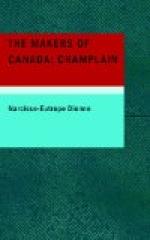The condition of the Recollets at this time was unenviable. The agents of the merchants were not better disposed towards them than the interpreters. Some of these agents were demoralized, and the reproach that they received from the fathers caused them to avoid their presence. The conduct of some of these agents was so bad that even the Indians, who were not strict in their morals, were scandalized. When we take into consideration these circumstances, and the meagreness of the resources of the order, and the difficulties they had in acquiring the language, we can form a faint idea of the hardness of their lot, and it was not without just cause that they decided to send Father d’Olbeau to France with Champlain, in order that the true state of affairs might be urged still further before the king.
Father Le Clercq says: “Meanwhile Monsieur de Champlain employed all his address and prudence, and the intrigues of his friends to obtain what was necessary for the establishment of his new colony. Father d’Olbeau, on his side, spared nothing; both spoke frequently to the members of the company, but in vain, for these people, who always had their ears open to flattering tales of the great profit to be made in the Indian trade, closed them to the requests and entreaties made them. They therefore contented themselves with what they could get.”
Father d’Olbeau at length received some consolation and compensation for all his labours, when a bull was issued by the pope, granting a jubilee to New France, which was celebrated at Quebec on July 29th, 1618, and was the first of its kind. For the celebration of this religious festival, the Recollets had built some huts, which were used as stations, and French and Indians proceeded from one of those improvised chapels to the other, singing the psalms and hymns of the church. In the year 1618, the Recollets in New France were only three in number: Fathers Le Caron and d’Olbeau, and Friar Modeste Guines.
During the winter of 1617-18 the missionaries were called upon to decide a difficult question. Two Frenchmen had disappeared in 1616, and the discovery of their bones proved that they had been murdered. A diligent search was instituted which led to the detection of the murderer, who acknowledged his crime. The question of punishment, however, was difficult from the fact that a clerk named Beauchesne, who had been invested with extensive civil power by Champlain, was in the habit of receiving gifts from the Indians. It was consequently considered dangerous to do anything that would displease the Indians, as they were known to be terrible in their vengeance. The Recollets had strongly protested against this method of receiving gifts, which placed the settlement in a false position towards the Indians. It was finally decided to release the prisoner and to accept as hostages two young Indians. When the matter was brought before Champlain, he approved of the course adopted, and stated that it was not a wise policy to be too severe.




